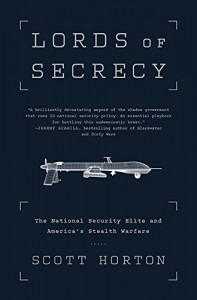
Scott Horton
5 out of 5 Stars.
Excessive control that is out of control . . .
By Still Singin' on February 16, 2015
LORDS OF SECRECY is one of the finest books I've read on national security “creep.” Scott Horton manages to retain at least some distance from obvious bias, but some of the information he lays out would cause any legitimate American citizen clenched teeth and a few well-placed emphatic comments.
Some, but not enough, of us are aware of the sleazy and frankly, corrupt ways in which our security state has inserted itself into foreign situations that lead to covert wars. Horton does not criticize the US use of drones per se, but but remarks that “the country needs to have a well-informed public discussion about the legal rationale for the use of drones as a part of our democratic process.” For example, the author compares the common foreign public knowledge of American predator drone activity with US lack of information. This is caused less by citizen apathy — much more by “a US decision to classify them as covert action,” and media inertia.
The author discusses how and why Americans have been purposely distanced from our foreign war activities. Ending mandatory conscription blunts public objection to being personally involved in war. Using private contractors (who as mercenaries often dress and act like our military — an illegal practice) diverts attention from the more obvious defense uses of our tax dollars and how we are required by statute to answer for that. Tech wars using drones and other sophisticated equipment that do not require the emotional presence of “boots on the ground” is an insidious methodology to disguise our activities overseas from the American public. . . . unlike some foreign nationals who must live with a 24-hour daily threat of possible annihilation.
I really liked the chapter which discussed Athenian democracy in the 5th Century BC . . . it serves as a salient intro to those of us who have forgotten how a real democratic system is designed to operate. Despite the obvious and egregious omissions of women and slaves, it still stands as a shining example and inspiration of what Americans are supposed to be practicing. It is never irrelevant to remind people of the heritage we seem to have forgotten.
And of course, our entanglement in never-ending war is just part of the problem of excessive national secrecy. The hazards of excessive bureaucracy, the whistleblower conundrum, the bloated depository of classified information which is out of control and not-so-secret anymore, the idea that “classified” has come to mean CYA more than protection of national security . . . are just some of the many issues we as public citizens need to discuss openly.
Essentially, we have given carte blanche to our national security apparatus to do an end run around Congress and the courts — to protect itself and expand its powers indefinitely. One must wonder: is it too late to stop this parasitical invasion of our body politic?




